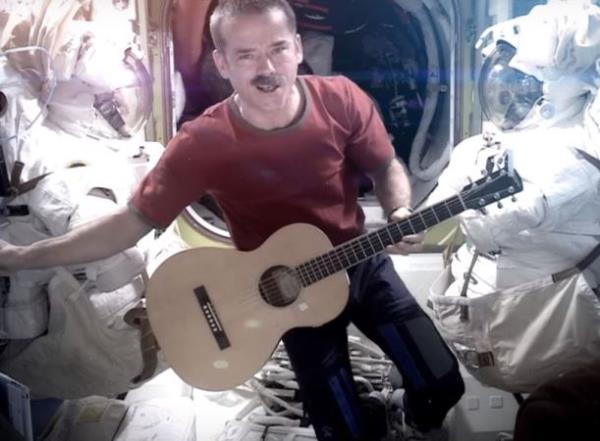
1. Growing up Without gravity yanking them down, space travellers actually end up growing around 3 percent taller in six months on the International Space Station (ISS). This is because in the zero-gravity environment, the spine is free to expand. They'll "shrink" to their normal height after being back on earth for a few months.
I think I found the perfect spot for a #selfie. #spacewalk
A photo posted by Tim Peake (@astro_timpeake) on
2. Muscle meltdown
Even if you're not a body-builder, you're constantly using your muscles on earth, even simply to fight gravity. But in orbit, humans no longer need muscles to support them -- and the body quickly starts to adapt, ridding itself of unnecessary tissue. Muscles begin to atrophy, meaning they get smaller and weaker. 3. De-boned Muscles aren't the only thing that start to disappear in space. If astronauts don't get enough exercise, they'll start to lose bone density. For this reason, there's a mini gym on the ISS, including two treadmills, two stationary bikes and a special resistance machine for "weightlifting" -- since free weights are pretty useless without gravity.
4. Puffy up top
After a few weeks in orbit, the liquid in astronauts' bodies will redistribute differently without gravity. The result? Weirdly puffy heads.
"Without gravity, bodily fluids move toward your head," astronaut Marsha Irvins told Wired. "It’s a great face-lift."
Read more: This photo an astronaut took of South Africa from space will take your breath away
5. Skinny down low For the same reason, space travellers will end up with super skinny legs -- which must be a sight to see on some of the burly men chosen for the gruelling job. "When we stand up on Earth, blood goes to our legs," Nasa explains on their site. "The heart has to work extra hard against gravity to move the blood all around the body. In space, without the pull of gravity, the blood moves to the upper body and head."
6. Sleepless nights (and days)
Thanks to cosmic rays -- high-energy particles that beam through the solar system -- astronauts don't get much Zzz on their first few weeks up there. Many have reported seeing "fireworks" or "streaks" that keep them up at night.
Of course, they also have to contend with more frequent sunrises -- every 90 minutes, to be precise. Still, they keep their clocks set to Co-ordinated Universal Time (UTC - about 2 hours behind us) and they work 9am to 5pm, just like on Earth.
On top of that, sleeping in space is not exactly comfy -- astronauts aboard the ISS have to strap themselves into their sleeping bags at night so they don't go drifting off. Sometimes, their heads will roll forward and their arms float up above their heads.
"It’s like camping. The bag has armholes, so you stick your arms through, reaching outside the bag to zip it up," Marsha Irvins remembered. "You tighten the Velcro straps around you to make you feel like you’re tucked in. Then you strap your head to the pillow—a block of foam—with another Velcro strap, to allow your neck to relax. If you don’t tuck your arms into the bag, they drift out in front of you. "Sometimes you wake up in the morning to see an arm floating in front of your face and think, 'Whoa! What is that?' until you realise it’s yours."
Having a little fun after conducting a leak check on our Sokol launch and entry suits.
A photo posted by Kjell Lindgren (@astro_kjell) on
7. Immune system 'depressed'
According to a 2014 study, astronauts' immune systems are seriously compromised in outer space.
"Things like radiation, microbes, stress, microgravity, altered sleep cycles and isolation could all have an effect on crew member immune systems," Brian Crucian, NASA biological studies and immunology expert, said in a statement. "If this situation persisted for longer deep space missions, it could possibly increase risk of infection, hypersensitivity, or autoimmune issues for exploration astronauts." Interestingly, they were also found to be more likely to develop latent viruses like chicken pox, which can be "reawakened" after time in orbit. 8. Senses don't make sense
A photo posted by Tim Peake (@astro_timpeake) on
Without gravity's downward pull, puffy-faced astronauts also end up congested. "It's the same as having a cold or allergies," astronaut and physician Scott Parazynski told Scientific American. "A stuffy nose definitely dampens your sense of smell and consequently your sense of taste."
Marsha would definitely agree.
"Between the lack of gravity and the shifting fluids, things can taste different in space. I’d bring great chocolate with me and it would taste like wax — it was very disappointing. But you don’t go to space for the gourmet dining."
9. Uncoordinated
Readjusting to life back on earth can be just as tricky. Some astronauts have reported dropping things in an attempt to let them float around nearby -- forgetting of course, that gravity will send them hurtling to the floor.
But their lack of coordination back on earth isn't just psychological.
"I never got sick going to space, but I never felt great coming home," Marsha admitted. "When you return, your inner ear — which keeps you balanced on Earth and which has been essentially turned off for the duration of your trip — feels a little gravity and becomes unbelievably sensitive.
"Your balance is off and you have to relearn how to move in a gravity field."
Speaking of space…
Have you booked your tickets for Gateway to Space: The Exhibition yet? Click here for a sneak peak of what’s in store at the exhibition.
Sourecs: Space.com, MSN.com, Wired, scienceonthego.griffith.edu.au




 Publications
Publications
 Partners
Partners

















